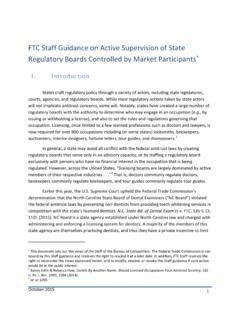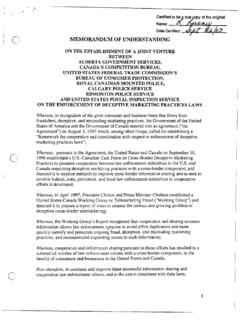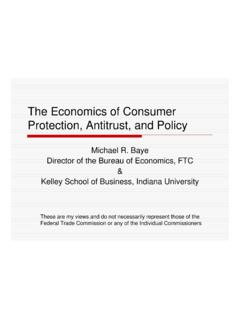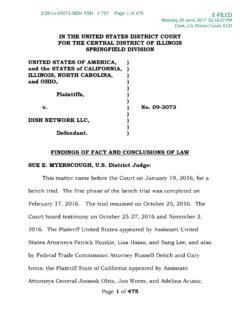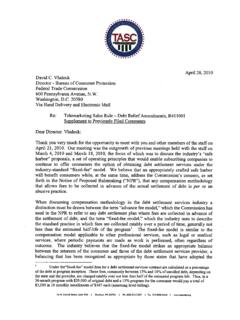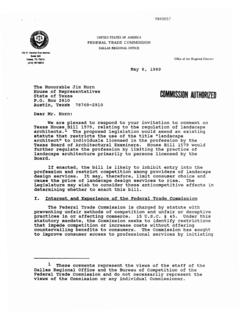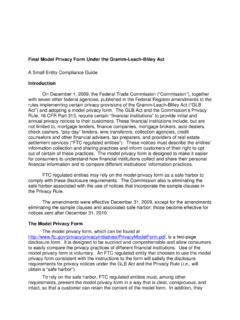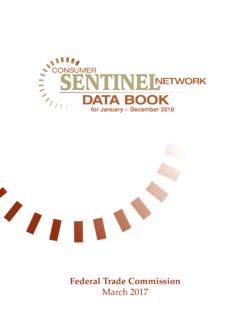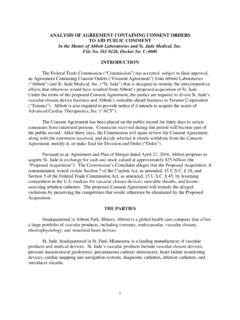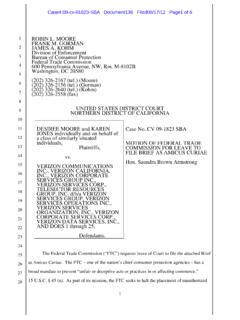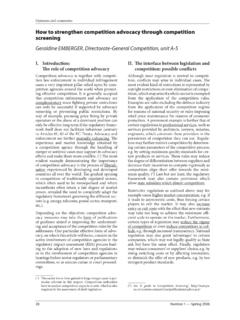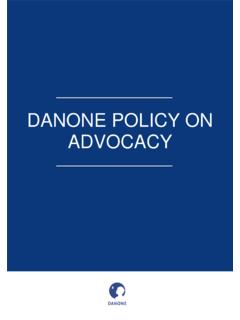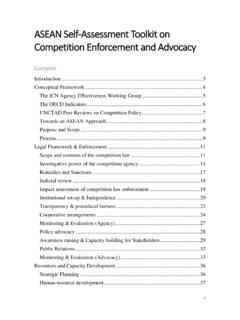Transcription of THEORY AND PRACTICE OF COMPETITION …
1 THEORY AND PRACTICE OF COMPETITION advocacy AT THE FTC JAMES C. COOPER PAUL A. PAUTLER TODD J. ZYWICKI* This past fall marked the thirtieth anniversary of a pivotal moment in the establishment of the modern COMPETITION advocacy program at the FTC, Chairman Lewis Engman s speech on the economic burden that inefficient transportation regulation policies were imposing on the COMPETITION advocacy , broadly, is the use of FTC expertise in COMPETITION , economics, and consumer protection to persuade governmental actors at all levels of the political system and in all branches of government to design policies that further COMPETITION and consumer choice.
2 COMPETITION advocacy often takes the form of letters from the FTC staff or the full Commission to an interested regulator, but also consists of formal comments and amicus curiae Although the FTC has been involved in COMPETITION advocacy activities since its founding, Engman s speech symbolized a new aggressiveness on the part of the FTC. 3 * The authors are, respectively, Attorney Advisor, Office of Policy Planning, Federal Trade Commission; Deputy Director for Consumer Protection in the Bureau of Economics, Federal Trade Commission; and Visiting Professor of Law, Georgetown Law Center and Professor of Law, George Mason University School of Law.
3 The views expressed herein are the authors own and do not purport to represent the views of the Federal Trade Commission or any Commissioner. We thank the editors of this Journal for helpful comments and Andrea Trujillo for research assistance. 1 Lewis A. Engman, Address at the 1974 Fall Conference of the Financial Analysts Federation (Oct. 7, 1974) (discussing regulatory excess and anticompetitive regulations; proposing vigorous antitrust enforcement as a substitute for regulation in certain industries). 2 Currently, the FTC s Office of Policy Planning is responsible for coordinating COMPETITION advocacy , and performs much of the substantive work as well, along with the Bureau of Economics ( BE ).
4 3 The legal authority for COMPETITION advocacy is found in Section 6 of the FTC Act, which allows the FTC to gather and compile information that concerns persons subject to the FTC Act, and to make public such portions of the information obtained that are in the public interest. 15 46(a), (f) (2005). See FRED MCCHESNEY ET AL., FEDERAL TRADE COMMISSION, COMPETITION AND CONSUMER advocacy : POLICY REVIEW SESSION 2-7 (June 9, 1982) (May 24, 1982 transmittal letter from Executive Director and Bureau Directors Bruce Yandle, Timothy Muris, Thomas Campbell, and Robert Tollison to the Commission) (hereinafter MCCHESNEY ET AL ); Arnold C.
5 Celnicker, The Federal Trade Commission s COMPETITION and Consumer advocacy Program, 33 ST. LOUIS U. L. J. 379, 381-82 (1989). Celnicker also notes that the House of Representative originally created the FTC 2 The economic THEORY of regulation ( ETR ) posits that because of relatively high organizational and transaction costs, consumers will be disadvantaged relative to businesses in securing favorable This situation tends to result in regulations such as unauthorized PRACTICE of law rules or per se prohibitions on sales-below-cost that protect certain industries from COMPETITION at the expense of consumers. COMPETITION advocacy helps solve consumers collective action problem by acting within the political system to advocate for regulations that do not restrict COMPETITION unless there is a compelling consumer protection rationale for imposing such costs on citizens.
6 Furthermore, advocacy can be the most efficient means to pursue the FTC s mission, and when antitrust immunities are likely to render the FTC impotent to wage ex post challenges to anticompetitive conduct, advocacy may be the only tool to carry out the FTC s mission. Notwithstanding its potential as a low-cost and in some cases, the only vehicle to carry out the FTC s core mission of promoting consumer welfare, the importance of the advocacy program relative to other components of the FTC markedly declined during the 1990s following its zenith in the mid 1980s. Only since Timothy Muris chairmanship has the advocacy program begun to enjoy resurgence.
7 In part, these mixed fortunes may reflect a lack of advocacy s fundamental grounding within the core mission of the FTC. The advocacy program, moreover, often has been politically controversial, exposing the Commission to criticism from special interests, Congress, and other governmental actors. only to gather and disseminate information, and that President Woodrow Wilson described the proposed FTC as an indispensable instrument of information and publicity. Id. at 380. Further, Celnicker points out that during the 1970s, Congress increasingly required government agencies to obtain the FTC s views on the competitive impact of certain agency actions.
8 Id. at 382. 4 See, , W. KIP VISCUSI, JOHN M. VERNON, & JOSEPH E. HARRINGTON, JR., ECONOMICS OF REGULATION AND ANTITRUST, 313-335 (3d ed. 2000). 3I. HISTORY OF MODERN COMPETITION advocacy AT THE FTC The use of the advocacy program has varied over time. Although imperfect, the number of annual advocacy filings (shown in Figure 1) provides a rough proxy for the vigor of the advocacy program over the past two decades. 5 Figure 1 FTC advocacy Filings 1980-2004 0102030405060708090100198019821984198619 8819901992199419961998200020022004 Fis cal Ye arFilings 5 A list of post-1994 advocacy filings may be found on the FTC Web site at Lists and descriptions of these and earlier filings can be found at the back of the FTC's Annual Reports, at least through 2000.
9 Unless otherwise noted, all counts of advocacy filings are from the data underlying Figure 1. 4 From 1980 to 2004, the 25 years for which reasonably comparable data exist, the FTC issued about 708 comments, an average of 28 per year. As readily seen in Figure 1, however, this average masks substantial swings in the Commission s use of advocacy over the years. The advocacy program has focused on COMPETITION , consumer protection, and regulatory fronts over the years, changing some with the public policy issues of the day. Several topic areas remained active over fairly long periods of Certain other narrow topic areas generated significant advocacy action for only a year or A.
10 COMPETITION advocacy FROM 1974 TO 2004 One can argue that the advocacy program (known internally as the intervention program in the 1970s and 1980s) dates back to the earliest days of the Commission, when the FTC submitted comments to the Fuel Administration (on coal pricing) and the War Industries Board (on steel). If we do not want to ascribe the origins of a program to distant and idiosyncratic events, a more representative date for the beginning of the program, and certainly for the program s modern era , would be October 7, 1974 when Chairman Louis Engman spoke about the broader use of antitrust policy as an alternative to the regulation of markets.
